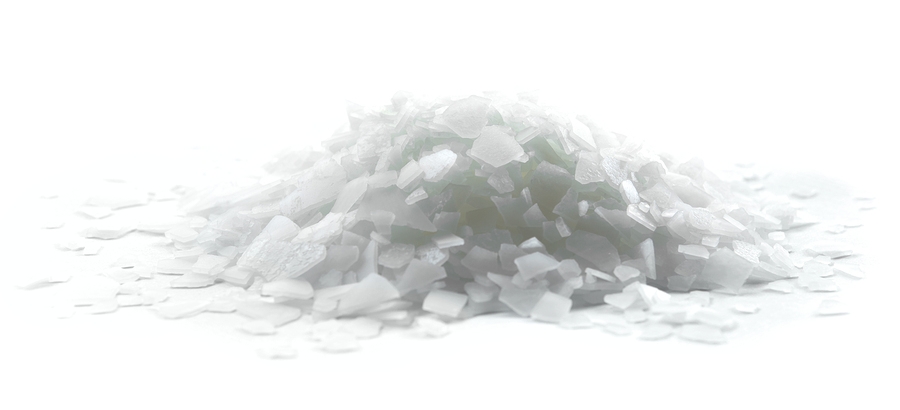Know Your Remedies: Magnesium Muriaticum (Mag-m.)
 Common Names: Magnesium chloride; muriate of magnesia.
Common Names: Magnesium chloride; muriate of magnesia.
General Information
Those who need Magnesium Muriaticum (Mag-m.) tend to be pacifists who dislike confrontation, quarrelling and aggression. Hidden or suppressed anger may sometimes appear in outbursts or result in bitterness. Physical symptoms usually arise from liver disturbances and digestive upsets which are aggravated by milk especially, but also fats and salt. Firm pressure tends to relieve symptoms while light touch worsens them. Symptoms also worsen at night (anxiety and colic) or for lying on the right side. Those needing this remedy may feel chilly yet want open air and feel better for it.
Mental-Emotional Symptoms
- Strong sense of responsibility but don’t cope well with the pressure of responsibilities.
- Dislike of any sort of confrontation.
- Dislike aggression in others and themselves.
- Quiet and composed disposition that masks inner emotions and anger.
- Bitter or sour temperament.
- Restlessness and anxiety that worsen on lying down.
- Overwhelming anxiety – especially at night when trying to sleep.
- Tendency to depression.
Head
- Headache in temples – much better for hard pressure.
- Deep furrows on face.
- Old and worn out appearance.
Teeth
- Difficult teething in infants.
Gastrointestinal
- Indigestion, abdominal pain, or diarrhoea from milk.
- Desire for sweets, vegetables, fruit and light food.
- Liver affected – e.g. hepatitis.
- Types of gallstone colic.
Sleep
- Anxiety on lying down and closing eyes.
- Prefers to sleep on the left side.
- Unrefreshed on waking.
- Dull, toxic feeling on waking.
Where do I find it?
Magnesium Muriaticum (Mag-m.) is available from our online store as a single remedy in either pills or liquid, and as part of the following Complex (combination remedy): Teething.
Home Treatment Guidelines
Acute, Self-Limiting Conditions
Conditions like colds or minor injuries, which are short-term and typically improve on their own, can be managed at home with homeopathy. However, in emergencies or if symptoms worsen, contact your healthcare provider.
Chronic Conditions
These home treatment instructions do not apply for ongoing issues, whether mentioned above or not, like persistent allergies or chronic pain. You should consult a qualified homeopath for a personalized treatment plan to achieve the best results with homeopathy for chronic conditions.
How to Take the Remedy for Acute Conditions
- Take one pill or five drops of the remedy. The frequency depends on symptom severity. As examples:
- For life-threatening symptoms, take every 1 minute and seek emergency help immediately.
- For mild symptoms, take every 4 hours.
- Stop taking the remedy once you feel better. Resume if symptoms return.
- If no improvement after four doses, choose a different remedy or consult a professional homeopath.
- For more details on dosing, refer to: How Often to Dose with a 30C Homeopathic remedy.
- For information on the different potencies, read: Guidelines on which potency to use
Additional Notes From Past Masters
Homeopathy is a 200-year-old system of medicine. Early homeopaths recorded detailed notes on how remedies worked, including initial tests, remedy relationships, and their experiences. These writings were shared to improve homeopathic practice and now offer fascinating insights into past uses of homeopathy. Here’s an example, edited and modernised for clarity, from Leaders In Homoeopathic Therapeutics (1898) by E. B. NASH M.D.:
Leaders In Homoeopathic Therapeutics by E. B. NASH M.D.
MAGNESIA MURIATICA.
Constipation, stools knotty or lumpy, like sheep dung; crumbling at the verge of the anus.
Nervous headache, > from pressure (Puls.); on wrapping the head up warmly (Sil.).
Palpitation of heart when the patient is quiet, > when moving about.
Urine; pale yellow; can only be passed by bearing down with abdominal muscles; weakness of bladder.
Adapted to nervous, hysterical women inclined to spasms.
* * * * *
This salt of Magnesia seems to act differently from the Magnesia carb., for while the latter most characteristically produces diarrhea, and we find it oftenest useful there, the former constipates.
It has a peculiar form of constipation. The stools are hard, difficult, slow, insufficient, knotty, like sheep’s dung, and crumble at the verge of the anus. Sometimes can only be passed by bearing down with the abdominal muscles.
The remedies most resembling it in this form of constipation are Natrum mur. and Ammonium mur. and now that I think of it I might as well mention here another similarity between Ammonium mur. and Magnesia carb. which is characteristic, viz.: The menstrual flow is worse at night. I forgot this when writing of Magnesia carb. Perhaps it will be all the better remembered for this interruption.
With the Magnesia mur. menstruation is very painful; accompanied with severe cramps, which may increase to general spasms of a hysterical nature. This nervous condition, if found coupled with the peculiar constipation above described, will be a sure indication for the use of this remedy.
Again it has a peculiar nervous headache, which is better from strong pressure (Pulsatilla), or wrapping head up warmly (Silicea). This headache also is often hysterical.
The spasms in connection with uterine troubles may find rival remedies in Actæa racemosa and Caulophyllum, the tout ensemble must decide.
Magnesia mur. is a liver remedy, and in some symptoms resembles Mercurius, notably, the tongue takes imprint of the teeth and the aggravation from lying on the right side. But the stools of these remedies are characteristically very different. Again, while Mercurius is best adapted to acute affections of this organ, Magnesia mur is more so to the chronic. Ptelea, liver troubles are worse when lying on the left side.
A very peculiar symptom of Magnesia mur., often confirmed is: palpitation of the heart when the patient is quiet, relieved when moving about.
Children cannot digest milk during dentition (Sepia).






